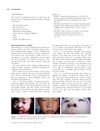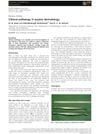 6 citations,
February 2021 in “Advances in Clinical and Experimental Medicine”
6 citations,
February 2021 in “Advances in Clinical and Experimental Medicine” Wharton's jelly-derived stem cells were safely used to treat four alopecia patients, resulting in hair regrowth in all of them.
 6 citations,
September 2019 in “Skin pharmacology and physiology”
6 citations,
September 2019 in “Skin pharmacology and physiology” RCS-01 therapy is safe and may improve skin structure by affecting gene expression.
 6 citations,
February 1974 in “The BMJ”
6 citations,
February 1974 in “The BMJ” The document concludes that scalp disorders can be treated with hair washing, specific shampoos, medications, and sometimes surgery or hair transplants, but hereditary baldness is untreatable.
 5 citations,
March 2016 in “Drug Development and Industrial Pharmacy”
5 citations,
March 2016 in “Drug Development and Industrial Pharmacy” New drug delivery systems improve treatment effectiveness and patient experience.
 4 citations,
December 2013 in “International Journal of Dermatology”
4 citations,
December 2013 in “International Journal of Dermatology” Three children with nasal fungal infections were successfully treated with potassium iodide and sometimes itraconazole.
 2 citations,
January 2019 in “Annals of dermatology/Annals of Dermatology”
2 citations,
January 2019 in “Annals of dermatology/Annals of Dermatology” A patient experienced permanent hair loss due to an allergic reaction to a corticosteroid injection.
2 citations,
September 2013 in “Journal of Veterinary Internal Medicine” Sweat hypersensitivity can cause severe skin issues in horses.
 1 citations,
August 2022 in “International journal of women’s dermatology”
1 citations,
August 2022 in “International journal of women’s dermatology” Botox injections may be a safe and effective way to treat severe, itchy skin disease when other treatments fail.
 1 citations,
June 2016 in “Equine Veterinary Education”
1 citations,
June 2016 in “Equine Veterinary Education” The document concludes that using the right diagnostic methods and careful sample handling is crucial for accurately diagnosing horse skin diseases.
 1 citations,
January 1967 in “The BMJ”
1 citations,
January 1967 in “The BMJ” The document concludes that while some hair and scalp disorders can be treated, hair loss from destroyed follicles is permanent, and damaged hair can only regrow naturally.
 September 2024 in “Indian Journal of Dermatology Venereology and Leprology”
September 2024 in “Indian Journal of Dermatology Venereology and Leprology” Mesotherapy with bicalutamide has limited effectiveness for female hair loss.
 August 2024 in “Journal of Marine Medical Society”
August 2024 in “Journal of Marine Medical Society” Dermoscopy helps diagnose skin issues and warns against unqualified treatments.
 July 2024 in “Medical alphabet”
July 2024 in “Medical alphabet” Betamethasone injections are more effective than Clobetasol for treating alopecia areata in children.
 June 2024 in “Archives of dermatological research”
June 2024 in “Archives of dermatological research” Both treatments work, but Minoxidil 0.5% MMP® is better for certain scalp areas and less advanced hair loss.

Sunekos® effectively improves labia majora appearance and is well-tolerated.
 March 2024 in “International journal of research in medical sciences”
March 2024 in “International journal of research in medical sciences” Dr. SKS hair booster serum effectively treats hair loss caused by COVID-19.
 August 2023 in “Journal of Dermatological Treatment”
August 2023 in “Journal of Dermatological Treatment” Mesotherapy might improve hair growth, but more research is needed to confirm its safety and effectiveness.
 March 2023 in “JAAD case reports”
March 2023 in “JAAD case reports” Botulinum toxin A may be an effective alternative treatment for the scalp disorder folliculitis decalvans.
 January 2023 in “Vìsnik problem bìologìï ì medicini”
January 2023 in “Vìsnik problem bìologìï ì medicini” Androgenic alopecia causes hair follicle degradation and skin restructuring, but some hair elements remain.
 March 2022 in “Brazilian Journal of Health Review”
March 2022 in “Brazilian Journal of Health Review” COVID-19 can cause a type of hair loss that usually starts 3-6 months after the illness, and treatment includes stress reduction and hair care products like Minoxidil.
October 2021 in “The journal of investigative dermatology/Journal of investigative dermatology” The new aptamer TAGX-0003 shows promise as an effective treatment for hair loss disorder alopecia areata.
 August 2021 in “Research, Society and Development”
August 2021 in “Research, Society and Development” Minoxidil slightly increased hair volume more than Finasterida, but both reduced hair loss similarly.
 April 2021 in “Journal of Investigative Dermatology”
April 2021 in “Journal of Investigative Dermatology” A trial showed that a new treatment is safe and effective for male pattern baldness, with most participants growing new hair.
 November 2020 in “Research Square (Research Square)”
November 2020 in “Research Square (Research Square)” Keratin injections in mice can stimulate hair growth and might help treat hair loss.
September 2020 in “Advances in anatomic pathology” A woman's large nose growth was initially misdiagnosed, but later confirmed to be giant rhinophyma after full removal and examination.
January 2018 in “프로그램북(구 초록집)” Botulinum toxin type A is a safe and effective treatment for male pattern baldness.
 April 2016 in “Journal of Investigative Dermatology”
April 2016 in “Journal of Investigative Dermatology” Microneedle arrays deliver botulinum toxin effectively for sweat suppression, similar to injections.
January 2015 in “Indo American Journal of Pharmaceutical Research” Mesotherapy uses small injections to improve skin, reduce fat, and treat hair loss effectively and quickly.
 May 2014 in “Journal of Investigative Dermatology”
May 2014 in “Journal of Investigative Dermatology” Scientists developed tools to observe hair regeneration in real time and assess skin health, using glowing mice and light-controlled genes.
January 2013 in “Российский журнал кожных и венерических болезней” The treatment improved hair growth and reduced hair loss.
























